
Biolinguistics
Scope & Guideline
Pioneering the Dialogue Between Language and Life
Introduction
Aims and Scopes
- Interface Between Language and Cognition:
The journal frequently publishes articles that examine the relationship between linguistic structures and cognitive processes, such as memory and syntax, emphasizing the biological underpinnings of language. - Evolutionary Perspectives on Language:
A significant focus is on the evolutionary aspects of language, including how language might have developed in humans and its implications for our understanding of human cognition and social behavior. - Formal Linguistic Theories:
Biolinguistics emphasizes formal theories in linguistics, such as the Strong Minimalist Thesis and the concept of Merge, exploring their implications for our understanding of language as a biological phenomenon. - Interdisciplinary Approaches:
The journal promotes interdisciplinary research that combines insights from linguistics, cognitive science, neuroscience, and evolutionary biology to develop a more comprehensive understanding of language. - Language Models and Cognition:
Recent publications indicate a growing interest in evaluating artificial language models in comparison to human linguistic cognition, shedding light on the nature of language processing.
Trending and Emerging
- Integration of Neuroscience and Language:
There is an increasing focus on the neural correlates of language processing, exploring how brain function relates to linguistic structures and cognition, emphasizing the biological basis of language. - Evaluation of Artificial Intelligence in Linguistics:
The journal is witnessing a trend towards evaluating language capabilities of large language models, which raises important questions about the nature of human linguistic cognition and the mechanisms underlying language. - Reconceptualization of Merge and Syntax:
Recent papers indicate a trend towards reevaluating foundational concepts in syntax, such as Merge, in light of new empirical findings and theoretical advancements, suggesting a shift towards a more nuanced understanding of syntactic operations. - Social and Evolutionary Linguistics:
There is a growing interest in the interplay between language evolution and social dynamics, highlighting how language functions within evolutionary contexts and its role in human social behavior. - Pragmatic and Contextual Approaches:
A trend toward incorporating pragmatic considerations into linguistic theories is emerging, reflecting a recognition of the importance of context in understanding language use and development.
Declining or Waning
- Traditional Syntax Theories:
There seems to be a decline in the exploration of traditional syntactic theories, with a shift towards more innovative approaches that integrate cognitive and biological perspectives rather than adhering strictly to established syntactic frameworks. - Feral Human Studies:
Research centered on 'feral' humans and their implications for language development has become less frequent, possibly due to a move towards more empirical studies grounded in contemporary human language use. - Toolmaking and Syntax Correlation:
The investigation of the relationship between toolmaking and the evolution of syntax has diminished, indicating a possible shift towards more direct studies of language's cognitive and biological aspects rather than metaphorical or analogical comparisons.
Similar Journals

Language and Linguistics Compass
Charting New Territories in Language and LinguisticsLanguage and Linguistics Compass, published by Wiley, stands as a premier journal in the field of linguistics, showcasing innovative and interdisciplinary research. With its ISSN 1749-818X and E-ISSN matching, the journal has built a robust reputation, achieving an impressive Q1 ranking within the linguistics category for 2023, placing it in the top 4% of its field. Its Scopus rank of 48 out of 1167 highlights its influence and significance among linguistics journals, boasting a commendable 95th percentile. This journal serves as a vital resource for researchers, professionals, and students, offering a wide range of accessible articles that illuminate current trends and advances within the domain of language studies. Although it is not Open Access, the journal is committed to quality and diversity in its publications, ensuring scholarly articles from various sub-disciplines of linguistics are represented from 2008 through 2024. Located in the United Kingdom, Language and Linguistics Compass invites contributions from around the globe, reinforcing its status as a leading forum for linguistic discourse.

RUSSIAN LINGUISTICS
Illuminating the intersections of language and psychology.RUSSIAN LINGUISTICS is a peer-reviewed academic journal published by Springer, dedicated to advancing the understanding of the Russian language and its interplay with various linguistic frameworks. With a longstanding history that spans from its inception in 1974, the journal encompasses a broad range of topics within the fields of linguistics and language studies, offering valuable insights especially in *Developmental and Educational Psychology* and the intricacies of linguistics at large. Currently ranked in the Q2 quartile for Linguistics and Language, and holding substantial positions within Scopus rankings, RUSSIAN LINGUISTICS serves as an essential resource for researchers, educators, and students alike, fostering dialogue and collaboration within the international linguistic community. The journal notably provides critical access to research findings that enhance the comprehension of Russian linguistics' role in a global context, despite operating under a traditional access model. For those pursuing scholarly excellence, RUSSIAN LINGUISTICS remains a pivotal platform for disseminating innovative research and promoting the study of language.
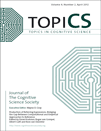
Topics in Cognitive Science
Exploring the Intersection of Mind and TechnologyTopics in Cognitive Science, published by WILEY, is a premier interdisciplinary journal that advances the understanding of the cognitive processes that underpin human behavior and interaction with technology. With a commendable impact factor and a strong focus on research from 2009 to 2024, this journal garners significant attention in various subfields, as evidenced by its Q1 ranking in Experimental and Cognitive Psychology and Linguistics and Language, alongside a Q2 position in Artificial Intelligence, Cognitive Neuroscience, and Human-Computer Interaction. Researchers and professionals will find invaluable insights into the latest experimental findings, theoretical discussions, and practical applications that bridge cognitive neuroscience, psychology, and computer science. Topics in Cognitive Science is especially pivotal for those aiming to delve deeper into cognitive mechanisms and their implications within our increasingly digital world, making it an essential resource for students and scholars alike.
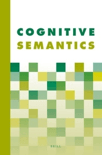
Cognitive Semantics
Diving Deep into the Semantics of ThoughtCognitive Semantics, published by BRILL, is a leading academic journal dedicated to the intricate study of cognitive processes underlying language use and semantic meaning. With its ISSN 2352-6408 and E-ISSN 2352-6416, this journal contributes significantly to the fields of linguistics and language studies, reflecting its importance in contemporary research on cognitive linguistics. Over its publication span from 2015 to 2024, it has established a niche as a Q3 ranked journal in the Linguistics and Language category for 2023, showcasing its relevance and growing influence in the academic community. Although currently not open access, the journal aims to provide a robust platform for exchanging ideas, theories, and methodologies related to cognitive semantics, fostering interdisciplinary dialogue among researchers, professionals, and students. Readers can expect to uncover valuable insights into the cognitive mechanisms that shape our understanding of language, making this journal an essential resource for anyone involved in linguistic research.

Journal of Language Evolution
Innovating the Dialogue Between Linguistics and NeuroscienceThe Journal of Language Evolution, published by Oxford University Press, serves as a vital resource in the intersection of linguistics, psychology, and neuroscience. With an ISSN of 2058-4571, this prestigious journal has established itself as a prominent platform for innovative research since its inception in 2016, converging valuable insights up to 2023. It boasts notable rankings, including Q1 in Linguistics and Language and Q2 in both Developmental and Educational Psychology and Developmental Neuroscience, reflecting its high impact and relevance in the academic community. The journal is indexed in Scopus, where it ranks in the 93rd percentile for Linguistics and Language, showcasing its influence among leading scholars. Researchers, professionals, and students will find the journal’s rigorous analysis and interdisciplinary approach essential for advancing their understanding of language evolution and its broader implications. Although access is limited, the journal’s commitment to excellence positions it as a must-read for those engaged in these dynamic fields.

Functions of Language
Innovating Understanding in Linguistics and Language StudiesFunctions of Language, published by John Benjamins Publishing Co, serves as a vital platform for scholars and practitioners in the fields of linguistics and language studies. With its ISSN 0929-998X and E-ISSN 1569-9765, this esteemed journal, based in the Netherlands, has solidified its reputation through a focused dedication to exploring the multifaceted roles that language plays across various contexts. Ranked in the top percentile of leading journals in Linguistics and Language (Q2 category, 2023) and holding impressive Scopus ranks within both the Arts and Humanities and Social Sciences sectors, the journal emphasizes research that interlinks theoretical insights with practical implications. Functions of Language aims to advance our understanding of linguistic structures and their applications, making it an essential resource for researchers, professionals, and students alike who are eager to contribute to the evolving discourse in language studies. With content converging from 1994 to 2024, the journal reflects ongoing scholarly engagement and innovation in the field.
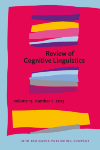
Review of Cognitive Linguistics
Unveiling the Dynamics of Language and CognitionThe Review of Cognitive Linguistics, published by John Benjamins Publishing Co, is a premier academic journal dedicated to the exploration of cognitive approaches to linguistics. With an ISSN of 1877-9751 and E-ISSN 1877-976X, this journal provides a critical platform for researchers and professionals to disseminate their findings in the rapidly evolving fields of linguistics and language, alongside developmental and educational psychology. Hailing from the Netherlands, the journal boasts impressive standing within the academic community, as indicated by its 2023 Q1 ranking in Linguistics and Language and Q3 in Developmental and Educational Psychology. Additionally, its Scopus rankings reflect a strong position within the arts and humanities and social sciences categories. While currently operating under a traditional access model, this journal actively contributes to the overarching discourse within cognitive linguistics, and is a vital resource for those aiming to deepen their understanding of the intricate link between language and cognition. Researchers, educators, and students are encouraged to engage with the rich body of articles spanning its convergence years from 2010 to 2024, making it an essential read for those at the forefront of these interdisciplinary studies.
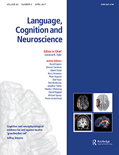
Language Cognition and Neuroscience
Unraveling the Mind: Where Language Meets Brain ScienceLanguage Cognition and Neuroscience is a premier peer-reviewed journal published by ROUTLEDGE JOURNALS, TAYLOR & FRANCIS LTD, focusing on the intersection of linguistics, cognitive psychology, and neuroscience. Since its inception in 2013, this journal has established itself as a vital resource for researchers and scholars, contributing significantly to the understanding of how language is processed and represented in the brain. With its impressive rankings in various categories—Q1 in Linguistics and Language, Q2 in Cognitive Neuroscience, and Experimental and Cognitive Psychology—it caters to a diverse and interdisciplinary audience. The journal is accessible to readers worldwide, effectively communicating cutting-edge research and innovative methodologies in the field. Open Access options enable broader disseminations of knowledge, ensuring that significant findings reach both academic and practical applications. With a commitment to high-quality research, Language Cognition and Neuroscience continues to be an influential platform for advancing theories and practices within cognitive science and language studies.
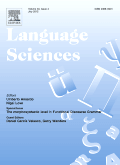
LANGUAGE SCIENCES
Fostering Insight into Language and SocietyLANGUAGE SCIENCES, published by Elsevier Science Ltd, stands as a prominent journal in the field of linguistics and language studies. With an impressive impact factor that solidifies its reputation, it holds a Q1 ranking in both the linguistics and language categories for 2023, reflecting its excellence and relevance in cutting-edge research. Since its inception in 1979, this journal has evolved to encompass a wide range of interdisciplinary studies, providing a platform for innovative research that addresses the complexities of language use, acquisition, cognition, and social interactions. The journal is hosted in the United Kingdom and features rigorous peer-reviewed articles that contribute significantly to both the academic community and practical applications in language-related fields. With access options tailored for a diverse range of readers and contributors, LANGUAGE SCIENCES invites scholars, students, and professionals to engage with its comprehensive body of work and contribute to the ongoing discourse in linguistics.

Suvremena Lingvistika
Championing Scholarly Dialogue in Linguistics Worldwide.Suvremena Lingvistika is a distinguished open-access journal published by the Croatian Philological Society, dedicated to advancing research in the field of linguistics and language. Since its establishment, the journal has been pivotal in promoting scholarly dialogue within the linguistics community, especially among researchers and academics in Croatia and beyond. With an ISSN of 0586-0296 and an E-ISSN of 1847-117X, the journal has transitioned to an open-access model since 2007, ensuring that research is freely accessible to all. As of 2023, it holds a respectable Q3 ranking in the Linguistics and Language category, reflecting its potential contribution to the field. The journal's scope encompasses a wide array of linguistic disciplines, encouraging both theoretical and empirical studies. Supportive of new research, Suvremena Lingvistika aims to foster innovative approaches and methodologies in linguistics, making it an essential resource for students, researchers, and professionals eager to explore the complexities of language. With its ongoing publication until 2024, it continues to shape the linguistic landscape, providing valuable insights and fostering collaboration among scholars globally.